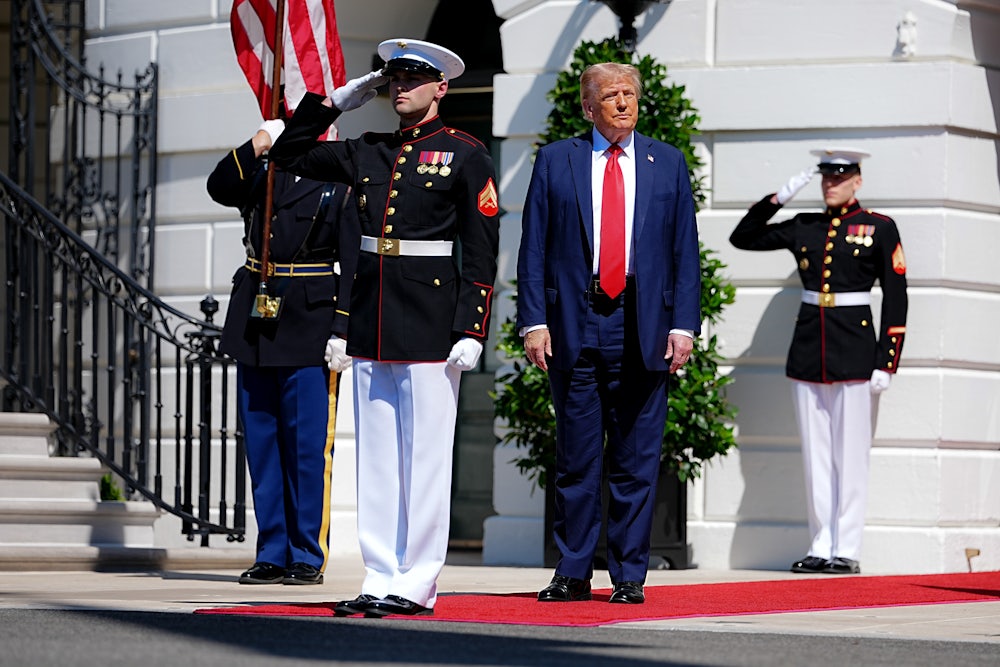China’s military prowess was on full display on Wednesday. At a parade in Beijing, thousands of soldiers marched in perfect formation alongside hypersonic missiles, undersea drones, and airborne tanks. But the parade’s guest list was somehow more ominous. Chinese President Xi Jinping was joined atop the Gate of Heavenly Peace by North Korean Supreme Leader Kim Jong Un and Russian President Vladimir Putin. It was a show of force from three of the world’s most notorious dictators, all of whom oversee nuclear arsenals.
The parade capped off a few days that could reshape international relations. Over the weekend, China hosted a summit of more than 20 leaders from non-Western countries, which largely made news because Xi was photographed laughing and clasping hands with Putin and Indian Prime Minister Narendra Modi. The unmistakable message was that their countries were becoming closer—and together would provide an alternative to U.S. global leadership.
This show of unity had an intended audience of one: Donald Trump. Just seven months into his second term, the president has upended nearly all of America’s most important alliances and inflamed many of its chief foes. Everyone—even long-standing partners like Canada and Germany—is looking for an alternative. Xi, Modi, and Putin may soon present one, isolating the U.S. even more than Trump has already done himself and creating fragmented alliances that ultimately make the world as a whole less stable and peaceful.
Ever since Trump first emerged as a political force a decade ago, a debate has raged over his foreign policy goals. Many of his backers—and even some of his detractors—have insisted that he’s a dove, a genuine departure from the bipartisan establishment that backed using America’s military might for imperialist aims. Trump himself has embraced this mantle, particularly during his 2024 campaign, when he insisted that he alone could swiftly end the wars that had been raging for years in Ukraine and Gaza; in office, he has ended neither but has nevertheless insisted he is deserving of the Nobel Peace Prize, citing a laundry list of half-baked (or nonexistent) accomplishments.
Others—again from across the political spectrum—have argued that Trump is deeply committed to sustaining and exercising America’s military strength. His defenders make the case that this is part of a larger “peace” project of sorts: that Trump will use American force clinically and ruthlessly to destroy threats and cow adversaries. Critics have argued that his use of the military is enormously reckless. His decision to bomb Iranian nuclear facilities in late June supplied grist for both arguments. It didn’t result in the worst-case scenario—the outbreak of a massive regional war—though it could have. But at the same time, it was only a qualified success, setting back Iran’s nuclear program by months rather than years (contrary to Trump’s claim that he “obliterated” its program).
The debate over whether Trump is a “hawk” or “dove” largely misses the point, however. That’s not how Trump sees himself or his role in the world. Trump approaches foreign relations, whether they be over armed conflicts or trade, by maximizing chaos and instability—and then hoping he can somehow claim victory by producing an agreement that ramps down tensions.
This is also precisely how Trump approached relationships during his career as a (mostly failed) businessman. Here’s how he outlines “dealmaking” in his bestselling book The Art of the Deal: “I never get too attached to one deal or one approach. For starters, I keep a lot of balls in the air, because most deals fall out, no matter how promising they seem at first.” This haphazard, loosey-goosey approach in office isn’t about flexibility—it’s just kinda crazy.
Trump thinks that this approach makes him a negotiator with an unparalleled ability to produce deals—hence his repeated promise that he could end the war in Ukraine on “day one.” This helps explain his recent, bizarre obsession with winning the Nobel Peace Prize: He sees it as an award for being the best dealmaker in the world. And we all know how much our insecure president likes to win awards (so much so that he invents them for himself).
Alas, Trump’s foreign policy approach is failing everywhere. The war in Ukraine is still raging and shows little signs of ebbing, despite Trump literally rolling out a red carpet for Putin in Alaska last month. The situation in Gaza is grimmer than ever: Israeli troops are conducting ground operations in Gaza City, the Israeli government is threatening to annex all of the West Bank, and Trump is clinging to a sociopathic plan to rebuild the Gaza Strip as a massive resort, the revenue from which would be used to “resettle” its Palestinian residents. He’s no closer to brokering an end to the conflict, and meanwhile risking alliances he has cultivated in the Middle East, particularly with Saudi Arabia, Qatar, and the United Arab Emirates. His “Liberation Day” tariffs, meanwhile, have infuriated nearly the entire world and turned even steadfast allies—particularly those in Europe—against the United States.
And I haven’t even mentioned Venezuela yet. In early August, Trump’s secretary of state, Marco Rubio, announced a $50 million bounty on the head of Venezuelan President Nicolás Maduro, and the U.S. has since deployed seven warships to the waters off Venezuela. Then, on Tuesday, Trump announced an airstrike on a boat in international waters that he said was piloted by Tren de Aragua “terrorists” smuggling drugs to the U.S. Eleven people were killed. On Wednesday, Defense Secretary Pete Hegseth promised that it was just the beginning of a larger assault on a nation that he deemed a “narco-state.” “President Trump is willing to go on offense in ways that others have not seen,” Hegseth said. As for regime change, “That’s a presidential decision, and we’re prepared with every asset that the American military has.”
By antagonizing friends and foes alike, Trump has isolated the U.S. globally, creating the ideal conditions for Russia, China, and India to join hands in what could be a globally destabilizing alliance. That’s the irony of his quest for a Nobel Peace Prize: The man who wants to rename the Department of Defense the Department of War has rapidly made the world a much more dangerous place. There’s no prize for that, but it’s clear who will reap the rewards.






